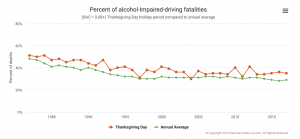Every day, millions of Americans are injured in automobile, motorcycle, or trucking accidents. From distracted drivers to large trucks barreling down the highway, the road can be a difficult place for anyone to navigate. What’s worse, many of these accidents can lead to serious injury, loss in quality of life and even permanent disabilities or death.
At Gold & Gold, we’ve seen every type of auto accident you can think of, and we understand what needs to be done to help our clients secure significant compensation that will help them manage their recovery and their future.
This time of year, it’s even more important to understand your risks and stay vigilant behind the wheel. According to the National Safety Council, automobile travel during the holidays results in a higher fatality rate than any other form of travel. This Thanksgiving, alone, auto accidents are projected to account for more than 410 deaths, according to the National Safety Council. Past data has also shown that an average of 350+ automobile travel-related fatalities occur during the three-day periods surrounding both Christmas and New Year’s.
While it’s nearly impossible to reduce your accident risk to zero — even those who ride as full-time passengers are statistically likely to be in one to two accidents in their lifetime — our auto accident attorneys have put together a list of tips for holiday travelers to help them stay vigilant and avoid the worst.
1. Don’t Use Your Cell Phone
Over the past few years, the number of cell phone-related auto accidents has skyrocketed. Many of today’s drivers think that sending one text or answering a short call while driving does not impair their ability to make quick decisions, but looking away from the road for one second could mean the difference between life and death.
Set your cell phone out of reach or, better yet, turn it off when driving to avoid the temptation to take your eyes off the road when you hear the telltale “ding!” of a notification. This will help you keep your eyes on the road and avoid other drivers who aren’t thinking about the safety of others.
2. Be Vigilant Around Trucks
Eighteen-wheelers and other large trucks present a dangerous obstacle for typical drivers. These oversized vehicles offer limited visibility for their drivers and are not as maneuverable as smaller vehicles, which can lead to catastrophic accidents.
Make an effort to stay out of a truck’s blind spots. The rule of thumb is, “If you can’t see the driver in the truck’s side-view mirror, the driver can’t see you.” At high speeds, if a driver can’t see you or isn’t paying close enough attention, this could mean disaster.
The team at Gold & Gold understands the strict rules and regulations that apply to truck drivers and has successfully litigated cases on behalf of clients fatally or catastrophically injured in trucking accidents.
For example, when a dump truck struck a car on the Florida Turnpike, killing the driver, our team went to work on behalf of the surviving mother to secure a significant settlement that eventually went toward a scholarship in the daughter’s name at Florida International University.
3. Wear Your Seatbelt
Studies show seatbelts effectively cut the fatality rate among front-seat passengers in half in the event of an accident. Despite this, nearly 50 percent of those killed in car crashes in 2017 were not buckled in. An IIHS survey conducted last year found 4 of 5 respondents don’t bother putting on a seat belt in the back seat for short trips or in a rideshare/taxi. It also found that nearly one-third of Prime-age adults (35 to 54 year-olds) do not wear a seat belt in the back seat.
This Thanksgiving weekend alone, an estimated 165 lives will be saved by seatbelts. But nearly 100 more could be saved if everyone who gets in the car buckles up. As simple as it is, many people choose not to “click it,” and pay the price. Don’t let yourself or your passengers be one of those people.
4. Don’t Drive Drowsy
When you plan your holiday travel, be sure to factor in the time of day. Drowsy driving can be just as dangerous as drunk driving. When you are tired you have reduced reaction times, impaired judgment, and difficulty anticipating the movements of other drivers.
As a result, you are more likely to get in an accident that could mean catastrophic injury.
- Get at least six hours of sleep (preferably eight) the night before driving
- Avoid nighttime travel when possible
- Schedule driving breaks every 2 hours or 100 miles
- Travel with an awake passenger
5. Drive Sober
Nationwide, 29% of the total traffic fatalities involved an alcohol-impaired driver in 2017. During Thanksgiving weekend, this number rose to 35%, a trend that occurs nearly every year.

Over 45 million drivers will take the road this Thanksgiving, but not all will make it to the dinner table. Don’t let drunk driving ruin your holiday season.
If your Thanksgiving plans include alcohol:
- Designate a sober driver
- Use a ride-sharing service
- Spend the night in
- Take public transportation
What to Do If You Get in An Accident
Even if you do all of these things, there is no guarantee that other drivers are being safe on the road. If you get in an auto or trucking accident, it’s incredibly important that you find a skilled, experienced, and reputable auto accident lawyer to represent your interests while negotiating car insurance company settlements or bringing lawsuits against other drivers who might be responsible for an accident.
The team at Gold & Gold has been working on behalf of those injured in automobile, motorcycle, or trucking accidents for more than 40 years. We understand what it takes to secure significant compensation for our clients.
No matter how big or small your case, our senior attorneys are personally invested in your success. If you’re looking for an auto accident lawyer to advocate for you, contact the team at Gold & Gold.

